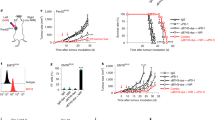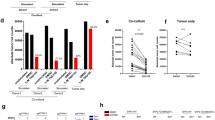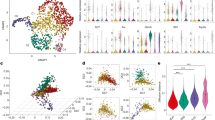Abstract
During the terminal stages of tumour growth (6-8 weeks) in Wistar rats bearing a syngeneic squamous cell carcinoma (Sp1), their sera can block in vitro anti-tumour cytotoxicity by immune splenic T lymphocytes. At an earlier stage of tumour growth (4-6 weeks) the sera do not block this cytotoxicity, but can induce anti-tumour cytotoxicity by non-immune spleen cells in the absence of complement. Sera taken at these 2 stages of tumour growth have been fractionated by ion-exchange chromatography, using DEAE-cellulose. The fractions have been examined by immunoelectrophoresis and tested for anti-tumour reactivity. Blocking activity was found in the Week-8 serum fraction eluted with 0-005M phosphate buffer, pH 7-4, whilst the "cytotoxic" activity of Week-4 serum was eluted with 0-02M phosphate buffer, pH 6-2. It is suggested that different IgG sub-classes are responsible for the 2 activities.
This is a preview of subscription content, access via your institution
Access options
Subscribe to this journal
Receive 24 print issues and online access
$259.00 per year
only $10.79 per issue
Buy this article
- Purchase on SpringerLink
- Instant access to full article PDF
Prices may be subject to local taxes which are calculated during checkout
Similar content being viewed by others
Rights and permissions
About this article
Cite this article
Chalmers, P., Matthews, N. & Nairn, R. Characterization of serum factors modulating splenic cytotoxicity in a syngeneic rat tumour system. Br J Cancer 34, 645–650 (1976). https://doi.org/10.1038/bjc.1976.226
Issue date:
DOI: https://doi.org/10.1038/bjc.1976.226
This article is cited by
-
Biochemical manifestations of a rat mammary adenocarcinoma producing cachexia: In vivo and in vitro studies
Immunology and Cell Biology (1990)



